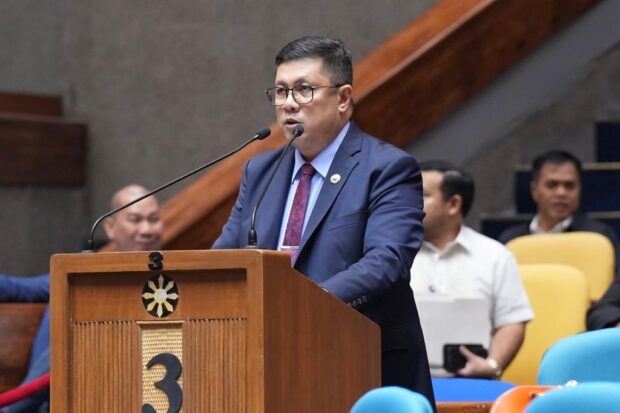Yamsuan prods DOTr to pursue PPP mode to ensure ‘Bicol Express’ revival
MANILA, Philippines – Bicol Saro Party-list Representative Brian Raymund Yamsuan has urged the Department of Transportation (DOTr) to pursue the Public-Private Partnership (PPP) mode in implementing the revival and modernization of the “Bicol Express”, the once-famed rail line of the Philippine National Railways (PNR) that ran from Manila to Albay.
Yamsuan said he was assured by DOTr Undersecretary for Railways Cesar Chavez that the revival of the Bicol Express or the PNR’s South Long Haul Project remains a priority of the administration of Ferdinand “Bongbong” Marcos Jr.
But with no clear direction yet from China on whether or not it would continue to fund the project, Yamsuan said the DOTr should instead push through with its option of employing the PPP mode to ensure that the project can get off the ground under the current administration.
PPP route
“Ang pangarap ng maraming Bicolano ay mabuhay muli ang Bicol Express. Many Bicolanos await the day when the Bicol Express chugs back to life with fast, modern trains. Our dream is for the Bicol Express to provide affordable, safe and comfortable service for commuters and make Bicol’s economy the fastest growing in the country,” Yamsuan said.
The South Long Haul Project, which is included in the list of the President’s “Build Better More” infrastructure program, has a P3 billion allocation this year under the DOTr’s proposed budget.
Article continues after this advertisement“Based on my discussions with Undersecretary Chavez, going the PPP route to implement the civil works aspect of the project is the best way to ensure that the Bicol Express project gets off the ground,” said Yamsuan, who has long been advocating for the revival of the rail line.
Article continues after this advertisementJobs, economic growth
Yamsuan said “the rebirth of the legendary rail line would create thousands of jobs and lead to the growth of micro, small and medium enterprises (MSMEs) in the Bicol region.”
“When the Bicol Express is reconstructed and fully operational, every station it passes along its line will be a busy hub of economic activity. Micro and small enterprises will be sprouting in every station, providing jobs for tens of thousands of Bicolanos,” Yamsuan said.
Other possible partners
The Bicol Saro lawmaker said he agrees with Chavez’s “PPP modality” of tapping foreign funding institutions like the Asian Development Bank (ADB) or the Japan International Cooperation Agency (JICA) to provide financing for the electromechanical system of the project, while the government funds the right-of-way acquisition and rolling stock, and partners with the private sector for the civil works aspect of the project.
During the budget deliberations of the House Committee on Appropriations on the DOTr’s proposed budget for 2024, Chavez said that if the government cannot get a definitive commitment from the Export-Import Bank of China (China Eximbank) this year for the P142 billion loan to implement the first phase of the project, he would recommend that the Department of Finance (DOF) seek other foreign partners or employ the “PPP modality” to get the project up and running.
The government currently has an ongoing P14-billion management consultancy contract with China Railways Design Corporation (CRDC) for the project.
But with China Eximbank giving no clear direction as to whether it would approve the loan application for the project, Chavez said the DOTr would have to terminate the contract with CRDC to be able to look for other possible funding sources.
Manila to Bicol
Connecting Manila to Bicol, the first package of the Bicol Express or the PNR’s South Long Haul Project is expected to reduce travel time between the two points from the current 14 to 18 hours to just 4 to 6 hours.
It is among the big-ticket rail projects included in the list of priority infrastructure projects under House Bill 8078, which provides for a 30-year national infrastructure program for 2023 up to 2052.
The bill was approved on third and final reading by the House last May.
The first package of the Bicol Express project, which Chavez said spans 386 kilometers from Calamba, Laguna to Daraga, Albay, was previously awarded to a joint venture of Chinese railway firms by the Duterte administration.
In July 2022, however, the loan agreement for the project was considered “withdrawn” after the Chinese government failed to act on the funding requests by the Duterte administration, according to the DOTr.
